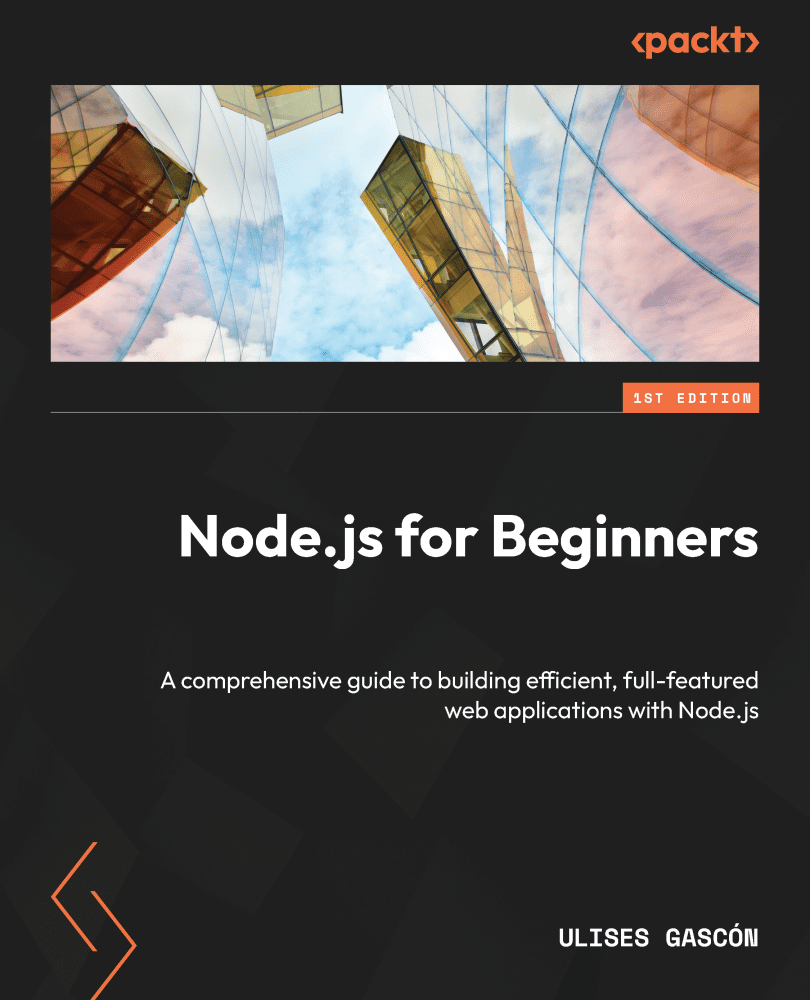Ulises Gascón is the author of Node.js for Beginners; we got the chance to sit down and find out more about his experience of writing with Packt.
Q: What is the name of your book?
Ulises: Node.js for Beginners
Q: What are your specialist tech areas?
Ulises: Building IoT solutions with open hardware, developing SaaS products, creating developer tools, managing microservices, migrating legacy systems, and designing distributed systems.
Q: How did you become an author for Packt? Tell us about your journey. What was your motivation for writing this book?
Ulises: It all began with my passion for Node.js and my desire to share my knowledge and expertise with others in the community. I have been teaching about Node.js for many years, and I wanted to consolidate all of that experience into a single book that is beginner-friendly. I wrote this book intending to provide the kind of guidance and instruction that I would have appreciated when I first started learning Node.js years ago, but updated to suit the needs of learners in 2024.
Q: What kind of research did you do, and how long did you spend researching before beginning the book?
Ulises: I continuously engage in reading about Node.js, particularly books and videos. Additionally, as a Node.js contributor and releaser, I possess a unique vantage point to anticipate upcoming features and changes that may be pertinent to new readers. This ongoing immersion in the Node.js ecosystem informs my research process for the book.
Q: Did you face any challenges during the writing process? How did you overcome them?
Ulises: Yes, I encountered numerous challenges throughout the writing process. Finding the time to dedicate to writing a book in today’s busy world was particularly daunting. However, meticulous planning played a crucial role in overcoming this hurdle. By carefully organizing my schedule and setting realistic goals and small achievements.
Q: What’s your take on the technologies discussed in the book? Where do you see these technologies heading in the future?
Ulises: Node.js has been a dominant technology for several years, and its future looks promising. With Node.js and JavaScript, developers can tackle a wide array of projects, whether they’re focused on web development, IoT, or other areas. Even for those without prior experience in building web applications, Node.js is an excellent choice. In the book, we provide comprehensive coverage of all the necessary knowledge, starting from scratch.
Q: Why should readers choose this book over others already on the market? How would you differentiate your book from its competition?
Ulises: This book sets itself apart from others on the market by taking an agnostic approach, focusing on fundamental concepts rather than specific frameworks or libraries. By doing so, readers can develop a solid foundation of knowledge that will serve them well in their future endeavors. Additionally, the content is tailored to the professional landscape of Node.js in 2024, encompassing essential topics such as testing, continuous integration, dockerization, security, error handling, and deployments. This ensures that readers receive a comprehensive and up-to-date learning experience that aligns with current industry practices.
Q: What are the key takeaways you want readers to come away with from the book?
Ulises: The primary takeaway from this book is the acquisition of essential theoretical knowledge across various areas, including the principles of web development (such as REST API) and security, alongside best practices. This theoretical foundation is then applied practically through an iterative project, allowing readers to see how these concepts translate into real-world scenarios. Furthermore, readers will learn the importance of testing in validating changes made during each iteration. Additionally, the book guides readers through the entire development cycle, from proof of concept (POC) to the deployment of the final product in a production environment, with a focus on potential distribution as a Docker image.
Q. What advice would you give to readers jumping into this technology? Do you have any top tips?
Ulises: Jumping into Node.js technology can be challenging initially, especially as it requires a shift in mindset towards asynchronous development. My top advice for readers embarking on this journey is to cultivate patience and persistence. It’s crucial not to get discouraged by the initial learning curve especially if you are not very familiar with JavaScript. I recommend exploring various packages and SDKs that pique your interest to maintain motivation, especially during challenging moments. Node.js boasts a diverse ecosystem, offering ample opportunities for exploration and learning. Furthermore, don’t shy away from making mistakes; they’re an integral part of the learning process.
Q. Do you have a blog that readers can follow?
Ulises: Sure, my blog is https://blog.ulisesgascon.com
Q: Can you share any blogs, websites, and forums to help readers gain a holistic view of the tech they are learning? What are the key takeaways you want readers to come away with from the book?
Ulises: As a starting point, I will recommend the following resources: – https://nodejs.org/en/learn/ | https://nodejs.org/en/blog | https://nodeweekly.com/
Q. How would you describe your author’s journey with Packt? Would you recommend Packt to aspiring authors?
Ulises: My author journey with Packt was truly rewarding. While I had previously self-published a few books, collaborating with Packt on this project proved to be a game-changer. The support and guidance provided by the Packt team were invaluable, helping me navigate the numerous challenges encountered during the writing process. I highly recommend Packt to aspiring authors. Their wealth of experience and dedication to supporting authors make them an excellent choice for anyone looking to publish a book. Writing with Packt felt like working towards a shared goal as a team.
Q. Do you belong to any tech community groups?
Ulises: Yes, I am an active member of the JavaScript ecosystem, serving as a core team member of Express and Node.js. I participate in numerous Working Groups and teams within these projects. Additionally, I am honored to have earned recognition as a Docker Captain, Microsoft Most Valuable Professional (MVP), and Google Developer Expert (GDE) for my significant contributions to the Node.js ecosystem.
Q. What are your favorite tech journals? How do you keep yourself up to date on tech?
Ulises: Most of the time, I use Social Media and RSS to follow up with the community. I have been doing that for many years, but in 2024, I will recommend you: – https://snyk.io/blog/ – https://dev.to/ – https://daily.dev/ . It is never too late to start using RSS.
Q. How did you organize, plan, and prioritize your work and write the book?
Ulises: The cornerstone of my approach was developing a comprehensive plan outlining the content for each chapter of the book. Once I had a clear overall concept in mind, I divided the book into manageable, smaller milestones, such as chapters or sections. Focusing on one milestone at a time helped me avoid context-switching and effectively allocate my time, seamlessly integrating the writing process with my daily activities.
Q. What is that one writing tip that you found most crucial and would like to share with aspiring authors?
Ulises: The most crucial writing tip I’d like to share with aspiring authors is to double your time estimations. Unlike self-publishing or blogging, writing technical books with editorial support entails a different process, often requiring more time for review than for writing. By allowing for extra time in your schedule, you can better accommodate the potentially extended review process and ensure a smoother overall experience.
Q. Would you like to share your social handles? If so, please share.
Ulises: Linkedin | Github | Twitter | Youtube | Mastodon
You can find Ulises’s book on Amazon by following this link: Please click here










